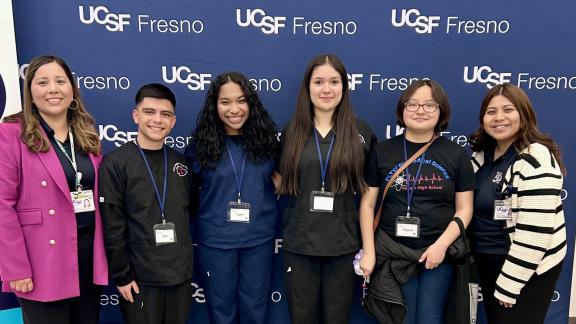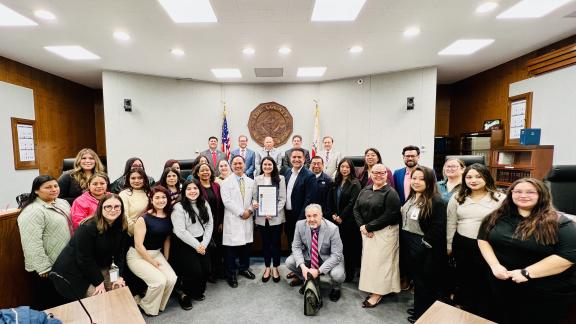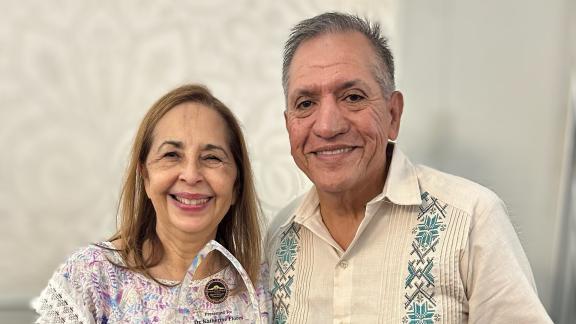Up Close | UCSF Fresno Physicians Volunteer at Two Cities Marathon to Provide Medical Care
For the past decade, UCSF Fresno Emergency Medicine and Wilderness Medicine physicians and medical residents have cared for race participants at the Two Cities Marathon that takes place yearly in Fresno/Clovis on the first weekend of November. And this year, the tradition continues.
Leah Bauer, MD, an Emergency Medicine faculty at UCSF Fresno, is the marathon’s medical director overseeing the planning for medical care at five medical tents along the full 26.2-mile course. More than two-dozen UCSF Fresno residents, from various departments, including Emergency Medicine, Surgery, Pediatrics, Family and Community Medicine and Obstetrics and Gynecology have volunteered to staff the medical tents.
UCSF Fresno has provided medical care at the event every year since about 2012, when Lori Weichenthal, MD, associate dean of graduate medical education at UCSF Fresno, who is an Emergency Medicine physician and a runner, saw a need for volunteer medical support, says Danielle Campagne, MD, interim chief of the UCSF Fresno Department of Emergency Medicine. Over the years, several faculty members at UCSF Fresno, including Dr. Campagne, have volunteered as medical director.
Dr. Bauer, who has run half-marathons and hopes to compete in a full marathon next year, started volunteering at the Two Cities Marathon several years ago during her Emergency Medicine residency at UCSF Fresno. “I started as just a volunteer at the finish line tent as a second-year resident,” she says. “They sent out the call for volunteers. And I was like that sounds so awesome. Event medicine is something I’m really interested in, and the running was just an extra bonus.”
Now, she is has taken the reins as medical director at the event, which this year includes the 26.2-mile full marathon, as well as a half marathon, a 10K run and a 5K run/walk. “This is a really awesome, really fun project for the residents, and because we don’t really have a lot of exposure to event medicine, this is a unique opportunity for them,” Dr. Bauer said.
In 2021, a total of about 3,500 people participated in the Boston qualifying marathon course, according to media reports. It takes about five UCSF Fresno volunteers, stationed at each tent to respond to the medical needs of runners, as well as those of onlookers. The UCSF Fresno volunteers must be prepared to handle cramping, electrolyte imbalances, wound care, allergic reactions – (even a heart attack, which thankfully has not occurred during her tenure as a volunteer, Dr. Bauer says).
Medical planning for the race starts several months in advance of the event and involves coordinating with race directors to decide where the tents will be placed along the course. Dr. Bauer asks residents who are interested in taking on the role of resident medical director to help recruit volunteers. This year, the resident medical directors are Emergency Medicine residents, Kayla Johnson, MD; Madeline “Maddie” Giegold, MD; and Jesus Martinez, MD. In addition to medical residents, volunteers this year include medical students, scribes, nurses, and other ancillary staff at Community Regional Medical Center. “It’s really a group effort,” Dr. Bauer says.
This is the second year Dr. Giegold has served as a medical resident director. She is a runner and volunteering at the marathon is a “fun way to get involved in the running community that also uses my skills as a physician,” she says. “And for us residents, it’s a great opportunity to get experience pre-hospital and event medicine.”
The resident medical directors work with Dr. Bauer a month before the race to review and prepare the supplies to stock at the tents along the course. They also help coordinate with American Ambulance to be on site should any race participant or onlooker need transport to a hospital. “American Ambulance has been our partner for years and years,” Dr. Bauer says. UCSF Fresno also partners with PRO~PT, a physical therapy provider and a race co-sponsor, for help with joint and musculoskeletal complaints, especially in the tent at the finish line.
Once all the volunteers are recruited and signed up, the resident medical directors make assignments for each tent along the course and assign a team captain for each tent. On the morning of the event (about 5:45 a.m.), the resident medical directors and volunteers gather and help erect the tents. “Our goal is to get there, get everything erected, set up, get all our supplies out, and make sure we all are communicating in case something happens at one of the tents far down on the course,” Dr. Bauer says.
“During the marathon, we’re definitely busy,” she says. “There’s a little bit of a lull if you’re at the start-line tent because the runners are running away from you. But the course this year has a 10K, which is a loop. So, while the marathoners are running away and the half-marathoners are running away, the 10Kers are actually coming back around. So, everyone is going to be busy this year.”
It’s a full day, but Dr. Bauer says she brings coffee and doughnuts. Everyone goes out after the race for a late lunch to debrief. “It’s just a good time to get together and hang out – outside of work – and do something different than the everyday of being in the hospital. And the participants are always really excited and they’re super grateful for the care.”
Dr. Campagne applauds the UCSF Fresno volunteers for their part in helping to make the Two Cities Marathon a safe and successful event. “I’m just really proud of our department for taking this opportunity to provide a great community service for our Valley.”





